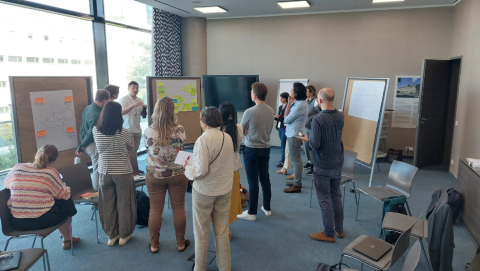New knowledge brief demonstrates the value of ecosystem-based adaptation across the Rio Conventions
New knowledge brief demonstrates the value of ecosystem-based adaptation across the Rio Conventions
At the recent Convention on Biodiversity (CBD) COP16 in Cali, Colombia, the Friends of Ecosystem-based Adaptation (FEBA) released a knowledge brief illustrating how Ecosystem-based Adaptation (EbA) supports the Kunming-Montreal Global Biodiversity Framework (KMGBF). It showcases EbA’s potential to play a dual role, addressing adaptation and resilience, and pre-emptively reducing loss and damage. Furthermore, it recognises nature as central to finding solutions to these issues, describing it as “a powerful ally in our fight against climate change, biodiversity loss and increasing inequality.”
All three Rio Conventions are holding COPs at the end of 2024: CBD COP16 has just finished, UNFCCC COP29 discussions are underway in Baku, Azerbaijan, and UNCCD COP16 will start in Riyadh, Saudi Arabia at the beginning of December. There has been increasing pressure from across the Rio Conventions to align climate and biodiversity action. FEBA’s knowledge brief shows the potential of EbA to respond to this pressure. It highlights how Targets 8 and 11 of the KMGBF can advance the United Nations Framework Convention on Climate Change (UNFCCC) COP29’s key objectives in an integrated, equitable, people- and nature-aligned approach.

CDKN’s EbA Thematic Lead, Nadia Sitas, reflects on conversations within the FEBA working group, explaining how this focus on EbA is relevant to several priorities currently under discussion in Baku.
How can COP29 achieve its aim to ramp up ambition in the global response to the climate crisis, emphasising adaptation alongside mitigation?
By promoting healthy ecosystems through EbA, the protection, restoration and sustainable management of biodiversity can help to strengthen natural buffers that reduce vulnerability to climate impacts, mitigating against future loss and damage. Strengthened ecosystems can act as protective barriers – coastal wetlands, for example, can buffer against storm surges – and they can provide essential adaptive benefits that help meet the Global Goal on Adaptation (GGA) set by the 2015 Paris Agreement.
Almost ten years on from the Paris Agreement, as governments update their Nationally Determined Contributions (NDCs) before the 2025 deadline, develop their National Adaptation Plans (NAPs) and revise their National Biodiversity Strategies and Action Plans (NBSAPs), the focus is on linking ambition with effective and sustained action that is fully inclusive, respectful and transparent to achieve the resilience needed to match a changing climate. FEBA’s knowledge brief outlines existing guidance on the climate-nature nexus, promoting synergies between climate adaptation and biodiversity through all the NDC, NAP and NBSAP processes.
How can COP29 facilitate agreement on funding mechanisms and modalities for loss and damage, and adaptation?
A key concern at COP29 is securing funds for loss and damage, and adaptation through a New Collective Quantified Goal (NCQG), which will need to reflect developing countries’ needs and priorities. EbA offers an effective approach that serves multiple purposes for addressing the impacts of climate change, and supporting communities to adapt to its effects. The KMGBF stresses the need to reduce impacts on biodiversity, including those from climate change, which aligns well with calls for financing ecosystem-based approaches that can address both climate and biodiversity goals. EbA projects that restore and manage ecosystems to absorb climate shocks can also qualify for funding streams that are dedicated to loss and damage, because they proactively reduce the economic and human costs of extreme weather events.
How can COP29 ensure global collaboration and equitable transitions?
Addressing loss and damage and meeting the GGA requires collaborative, equitable solutions. Both the KMGBF and the UAE Framework for Global Climate Resilience on protecting and managing ecosystems can only be achieved through inclusive, cross-scale partnerships among governments, civil society and local communities. EbA initiatives that are locally-led and rooted in local ecosystems can facilitate just transitions by incorporating human rights-based approaches. These recognise and incorporate Indigenous and local knowledge, and free, prior and informed consent, which is essential for building long-term resilience and fulfilling the GGA.
How do COP29’s goals for adaptation align with climate resilience action?
Enhancing resilience to climate impacts aligns strongly with COP29’s goals on ambitious adaptation. By supporting the KMGBF Target 8’s focus on protecting biodiversity from climate-induced harm, EbA projects can fortify ecosystems that provide vital services to communities – such as water filtration, soil stabilisation, and flood management. This directly supports the criteria set by the GGA and the Paris Agreement by increasing climate resilience and reducing loss and damage, especially for populations living in vulnerable conditions who rely heavily on ecosystem services. Importantly, it also aligns with work under the Sendai Framework for Disaster Risk Reduction and United Nations Convention to Combat Desertification (UNCCD), highlighting the additional benefits of EbA approaches for achieving the targets across global conventions and policy frameworks working to enhance positive outcomes for people and nature.
The FEBA working group conversations demonstrate how an EbA approach can provide linkages between the interconnected challenges of biodiversity loss, inequality and climate change at the level of global policy processes and during the trio of Rio Conventions’ COPs. To ensure decisions made at a global level are actioned, it will continue to be critical to empower and amplify the work of local communities and local initiatives that are leading EbA projects on the ground where these linkages are already happening.
______________________________________________
About Friends of Ecosystem-based Adaptation (FEBA)
FEBA is a global collaborative network of more than 100 organisations and agencies working on ecosystem-based adaptation. Its mandate is to improve collective understanding, share experiences and knowledge, accelerate implementation, and build a strategic policy influence around nature and climate adaptation. In January 2024, FEBA established an expert working group, guided by the CBD Secretariat and CDKN to assist national target setting and the implementation of KMGBF Targets 8 and 11. The focus was on the link between climate change and biodiversity, specifically via EbA approaches.

